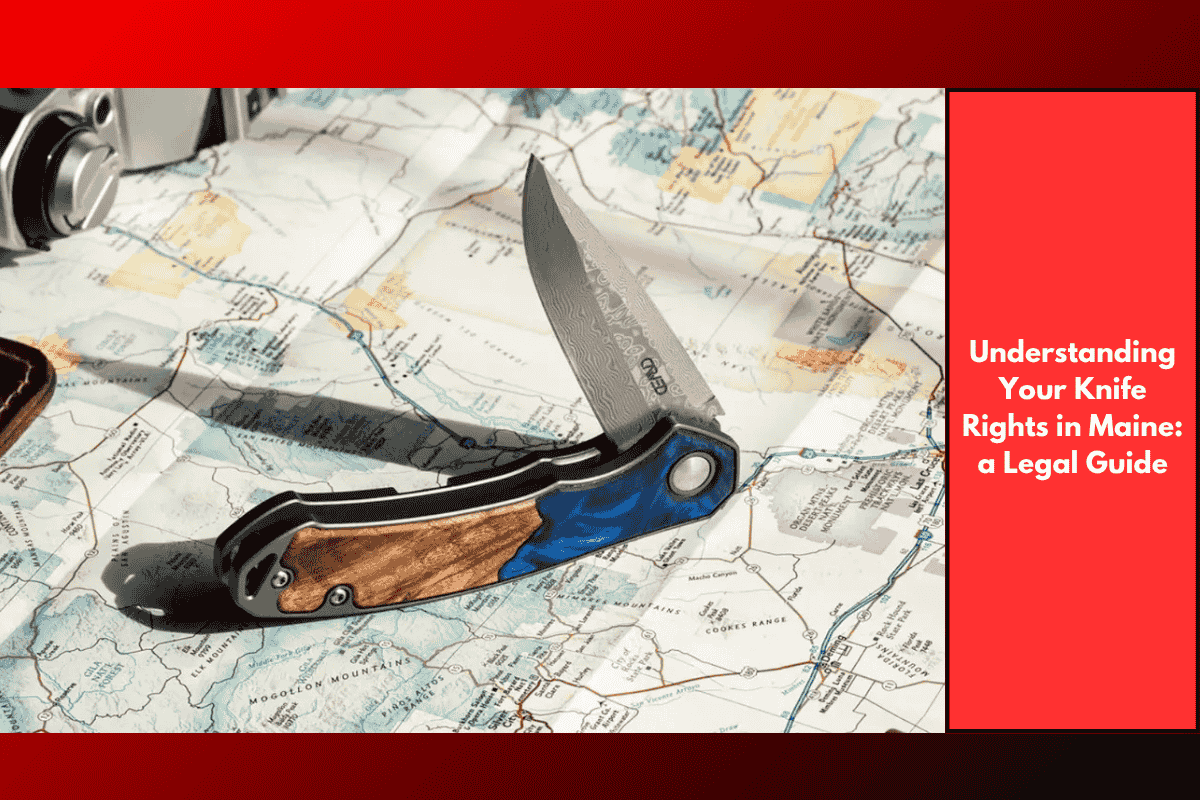In Maine, as in other states, owning and carrying a knife comes with specific rights and responsibilities. Understanding these laws can be essential for ensuring you’re within legal boundaries, whether you’re using a knife for work, recreation, or self-defense. This legal guide will explain what you need to know about knife ownership, carrying, and restrictions in Maine.
Maine Knife Laws: What You Need to Know
Maine has relatively lenient laws regarding knives, but that doesn’t mean there aren’t restrictions. Knife laws generally fall under state criminal code and focus on the intent behind carrying the knife, the type of knife, and where it’s being carried. Here’s an overview of the most important points:
Types of Knives and Their Legal Status
In Maine, the type of knife you carry can influence its legality, especially if it’s carried in public or concealed.
Common Knives: Most everyday knives, including pocket knives, folding knives, and fixed-blade knives, are legal to own and carry in Maine.
Automatic (Switchblade) Knives: Switchblades or automatic knives are typically banned under federal law, but Maine has its own stance on carrying automatic knives. Generally, switchblade knives are illegal to carry unless you have a specific reason, such as employment in a relevant field (e.g., fishing or rescue).
Bowie Knives and Large Fixed-Blade Knives: There are no specific bans on large fixed-blade knives like Bowie knives, but their carrying could be considered illegal if done with criminal intent or in places where large weapons are restricted.
Concealed Carry and Open Carry
Concealed Carry: Maine allows open carry of most knives, which means you can openly carry a knife on your person without needing a permit. However, concealed carry (hiding a knife on your person) has specific rules. A concealed weapon can be legally carried if you have a concealed carry permit. However, carrying a knife concealed in public without intent to use it as a weapon is generally legal. Still, if there is an intent to use it for harm, the situation could change.
Public Carry: You can legally carry a knife in public in Maine, but there are restrictions on certain places such as schools, government buildings, and private property where knives may be prohibited. Always be mindful of private property rules regarding knives in places like stores or businesses.
Laws on Carrying Knives with Intent
Criminal Intent: Maine law criminalizes carrying a knife with intent to use it unlawfully. If a police officer suspects you of carrying a knife with the intent to commit a crime, such as assault, you could face legal consequences. This includes carrying a knife in a manner that may be viewed as threatening.
Self-Defense: While knives are legal to carry, using a knife for self-defense is treated differently. Maine allows the use of reasonable force for self-defense, but the law prohibits carrying knives specifically for use as a weapon unless there is a valid reason for carrying it, such as hunting or outdoor activities.
Restrictions on Certain Locations
While knives are generally legal in Maine, there are specific places where carrying knives is prohibited:
Schools: Maine law prohibits carrying a knife onto school grounds, including public and private schools, unless you are a law enforcement officer or authorized personnel.
Government Buildings and Courtrooms: Knives are prohibited in government buildings or courtrooms, similar to other weapons.
Private Property: A business or property owner may have the right to set their own rules about carrying knives on their property. Always check for posted restrictions before entering a private property.
Knife Use in Hunting and Fishing
Knives are legal to use for hunting and fishing in Maine. Whether it’s for cutting lines, field dressing, or general use, a knife is an essential tool in these activities. When used for these purposes, knives are generally seen as practical tools, not weapons. However, keep in mind that the same rules on carrying intent apply. If you’re in a hunting area and carrying a knife, make sure it’s not concealed with the intent to harm.
Knife Laws and Minors
In Maine, minors (people under 18) are generally restricted from carrying certain types of knives, especially switchblades or gravity knives. However, owning a knife is allowed under certain conditions. Parental consent or involvement in activities like hunting or fishing may make it legal for minors to possess a knife. Like adults, minors can face legal consequences if a knife is carried with criminal intent.
How to Stay Within the Law When Carrying a Knife
To stay on the right side of the law in Maine:
Avoid Carrying Knives Concealed: While you may carry a knife openly, avoid carrying a concealed knife in public without a concealed carry permit.
Know Your Intent: Carry a knife only when you have a legitimate reason, such as outdoor recreation or a practical tool for work.
Follow Property Rules: Be mindful of where you are carrying your knife. Schools, government buildings, and private properties may have restrictions.
Consider Knife Type: Be careful about carrying certain types of knives, such as switchblades or large fixed-blade knives, especially in urban areas.
In Maine, owning and carrying a knife is largely permissible as long as you’re mindful of the intent behind it and the location where you’re carrying it. While carrying knives openly is allowed, concealed carry, especially without a permit, can be a gray area. The key is to always stay informed about where and how you’re carrying knives, ensuring you’re doing so within the boundaries of the law.
SOURCES
[1] https://nobliecustomknives.com/us-knife-laws/maine-knife-laws/
[2] https://www.akti.org/state-knife-laws/maine/
[3] https://ravencresttactical.com/maine-knife-laws/
[4] https://worldpopulationreview.com/state-rankings/knife-laws-by-state
[5] https://legislature.maine.gov/statutes/17-a/title17-Asec1055.html














